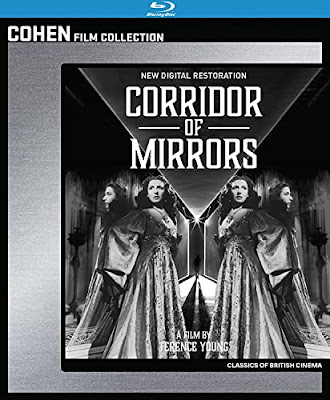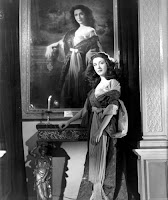It was supposed to be the grand debut of South African thesp Edana Romney, but it is now more remembered as the first films of Sir Christopher Lee and future James Bond franchise director Terence Young. For Lee, it now seems like a reasonably appropriate and not completely inauspicious debut, as a somewhat gothic, Daphne Du Maurier-like psychological thriller (with scenes in a wax museum and a masquerade ball). It was also a film about an artist’s obsession with beauty, so it had to look good. Young’s strikingly lush black-and-white Corridor of Mirrors gets a shiny new digital restoration, which releases tomorrow on BluRay, from Cohen Media.
We know from the in media res prologue, this story will end in tears. When the flashback commences, fans do not have to wait long to see Lee, because he is part of the aimless smart-set the beautiful and eligible Mifawny Conway whiles away her nights with in London’s fashionable clubs, along with Lois Maxwell (who would be forever known as Miss Moneypenny in the Bond films). Reportedly, Young has to lend Lee his dinner jacket for the scene. Apparently Conway is a bit bored with the old gang, because when legendarily ill-tempered artist Paul Mangin walks in, she is quite struck by his Byronic figure.
Soon, she is visiting him in his luxurious but old-fashioned mansion (mostly candle-light rather than gaslight), where he dresses her in his exquisitely rendered historical costumes, complete with matching jewelry sets. It is like she is his personal doll to dress up as he pleases. To some extent, they are also lovers, but their relationship is really one of uncomfortable control and submission.
Eventually, Mangin admits he believes they are the recreation of Renaissance era lovers, whose faithless relationship terminated in violence. Indeed, she is the spiting image of the portrait that fuels his obsession, which sufficiently freaks out Conway to rouse her from her trance-like state.
Visually, Corridor is a dazzler. Imagine the thematically similar Vertigo (which it predates by ten years), as directed by Cecil Beaton. The technical artistry is remarkable, starting with Mangin’s Escher house, which does indeed include then titular corridor (the mirrored doors conceal closets, holding outfits on one side, with the matching jewels opposite). Somehow, it is also larger enough to house a costumed bacchanal that looks like it could have been cut from Orson Welles’ Merchant of Venice.
Andre Thomas’s glorious cinematography is like a dark, gossamer dream, while the richly romantic soundtrack builds on motifs from “Black was the Color of My True Love’s Hair” and “These Foolish Things” (also heard in a weirdly operatic rendition during the nightclub scene). The sets, dressings, and costumes are some of the finest ever captured on film. The technical artistry is fabulous, but Romney’s screenplay, co-written with her filmmaking partner Rudolph Cartier is definitely a hodge-podge of lurid melodramatic elements, but they predate plenty of classic films, such as Vertigo, Dead Again, and just barely Portrait of Jennie.
Romney, who became more of a daytime-TV celebrity is pretty good as the malleable and overwrought Conway. Eric Portman was getting typecast as dark, brooding romantic heavies, so continued to play to his tall, dark, and intense strengths as Mangin—but he’s no Christopher Lee. Lee is fun to watch, but he doesn’t quite have his Hammer magic going on yet. However, under-heralded British character actor Leslie Weston brings poignant dignity to the film, portraying Mangin’s loyal manservant, Mortimer.
Even if it isn’t utter perfection, Corridor of Mirrors should still be considered a classic. It is a rich and romantic vision, with the added historical significance as Lee and Young’s first films. Among the films true cineastes might consider upgrading from DVD to BluRay, Corridor could definitely be one. It is not really gothic horror, but Christopher Lee fans should still appreciate its aesthetics and tropes. Highly recommended, Corridor of Mirrors releases tomorrow (10/19) on BluRay.

